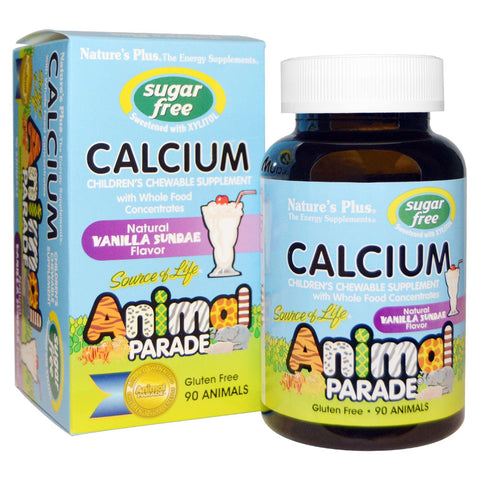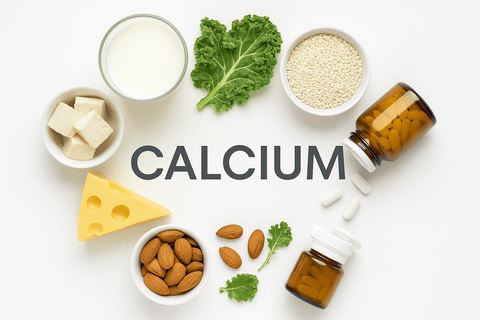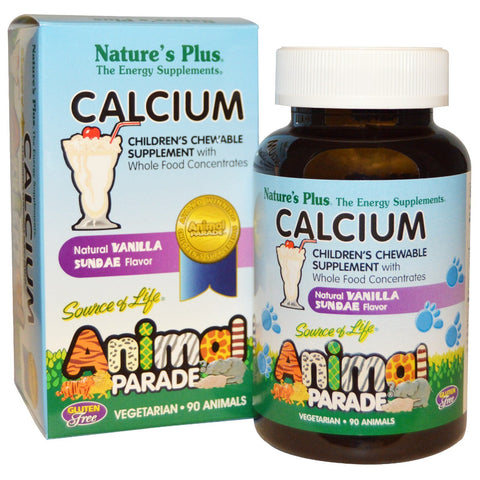5 products


Calcium Benefits: Bone, Muscle, Teeth & Energy Support
🦴 Calcium Benefits: Bone, Muscle, Teeth & Energy Support (EFSA Approved)
📚 Table of Contents
-
Introduction
-
What Is Calcium?
-
EFSA-Approved Health Claims for Calcium
-
Calcium in the Human Body
-
Calcium and Bone Health
-
Calcium and Teeth Maintenance
-
Calcium and Muscle Function
-
Calcium and Energy-Yielding Metabolism
-
Calcium and Neurotransmission
-
Calcium and Digestive Enzyme Function
-
Calcium in Cell Division and Specialisation
-
Natural Sources of Calcium
-
Recommended Daily Intake (EFSA Guidance)
-
Calcium Absorption: What Affects It?
-
Types of Calcium Supplements
-
Deficiency Signs and At-Risk Groups
-
Safety and Tolerable Upper Intake Levels
-
Calcium Across Life Stages
-
SEO-Optimized FAQs
-
Conclusion
1. 📖 Introduction
Calcium is the most abundant mineral in the human body. Known primarily for its role in bone health, calcium performs a wide range of vital physiological functions.
The European Food Safety Authority (EFSA) has scientifically validated multiple health claims related to calcium, supporting its role in muscle function, metabolism, neurotransmission, and beyond.
In this comprehensive article, we explore each of the EFSA-approved benefits of calcium, its dietary sources, optimal intake levels, and how to make the most of this essential mineral.
2. 🔍 What Is Calcium?
Calcium is a macromineral found predominantly in bones and teeth, but also present in blood, muscle, and intracellular fluid. It’s essential for:
-
Skeletal structure
-
Muscle movement
-
Cellular signalling
-
Enzyme activation
Because the body doesn’t produce calcium, it must be consumed regularly through diet or supplements.
3. ✅ EFSA-Approved Health Claims for Calcium
The European Food Safety Authority has approved the following claims for calcium:
-
Contributes to normal blood clotting
-
Contributes to normal energy-yielding metabolism
-
Contributes to normal muscle function
-
Contributes to normal neurotransmission
-
Contributes to the normal function of digestive enzymes
-
Has a role in the process of cell division and specialisation
-
Is needed for the maintenance of normal bones
-
Is needed for the maintenance of normal teeth
All claims are regulated under Regulation (EC) No 1924/2006 and supported by scientific consensus.
4. 🧬 Calcium in the Human Body
About 99% of the body's calcium is stored in bones and teeth. The remaining 1% supports blood clotting, nerve conduction, and muscle contraction.
Calcium levels in blood and tissue are tightly regulated by hormones such as parathyroid hormone (PTH), calcitonin, and vitamin D.
5. 🦴 Calcium and Bone Health
✅ EFSA Claim: “Calcium is needed for the maintenance of normal bones.”
Calcium is a major structural component of bones. It forms hydroxyapatite crystals with phosphate, giving bones their strength and rigidity.
During childhood, adolescence, and early adulthood, calcium intake supports peak bone mass development. In older adults, it helps slow bone mineral loss.
6. 😁 Calcium and Teeth Maintenance
✅ EFSA Claim: “Calcium is needed for the maintenance of normal teeth.”
Calcium supports the mineralisation of tooth enamel and dentin. It also plays a role in protecting teeth from erosion, especially when combined with adequate fluoride and vitamin D.
7. 💪 Calcium and Muscle Function
✅ EFSA Claim: “Calcium contributes to normal muscle function.”
Muscle contractions depend on the release of calcium ions, which bind to troponin, allowing actin and myosin filaments to slide and create movement.
Both smooth (e.g., in intestines) and skeletal muscles require calcium for proper function.
8. ⚡ Calcium and Energy-Yielding Metabolism
✅ EFSA Claim: “Calcium contributes to normal energy-yielding metabolism.”
Calcium supports enzyme systems involved in breaking down carbohydrates and fats for energy production.
It also assists in cellular respiration and energy delivery to muscles and organs.
9. 🧠 Calcium and Neurotransmission
✅ EFSA Claim: “Calcium contributes to normal neurotransmission.”
Calcium triggers neurotransmitter release from synaptic vesicles in neurons, facilitating nerve-to-nerve and nerve-to-muscle communication.
Without sufficient calcium, these processes become impaired, affecting cognition and coordination.
10. 🍽️ Calcium and Digestive Enzyme Function
✅ EFSA Claim: “Calcium contributes to the normal function of digestive enzymes.”
Calcium activates digestive enzymes such as trypsinogen and lipase, which are critical for breaking down protein and fats in the small intestine.
11. 🧫 Calcium in Cell Division and Specialisation
✅ EFSA Claim: “Calcium has a role in the process of cell division and specialisation.”
Calcium regulates intracellular signalling, controlling the cell cycle and helping undifferentiated cells develop into specialised cells (e.g., neurons, muscle cells).
This function is vital for tissue repair and development.
12. 🥬 Natural Sources of Calcium
| Food | Calcium (mg/100g) |
|---|---|
| Parmesan cheese | 1184 mg |
| Plain yogurt | 120–150 mg |
| Sardines (with bones) | 382 mg |
| Kale (cooked) | 150 mg |
| Almonds | 264 mg |
| Tofu (calcium-set) | 350 mg |
| Sesame seeds | 975 mg |
| Figs (dried) | 162 mg |
| Broccoli | 47 mg |
| Fortified plant milk | 120–240 mg |
Dairy products, small fish with bones, and leafy greens are excellent sources.
13. 📏 Recommended Daily Intake (EFSA Guidance)
| Age Group | Calcium RDI |
|---|---|
| Children (1–10 yrs) | 450–800 mg |
| Adolescents (11–17 yrs) | 1150 mg |
| Adults (18–24 yrs) | 1000 mg |
| Adults (25+) | 950 mg |
| Pregnant/lactating women | 1000–1050 mg |
These levels reflect adequate intake (AI) needed to maintain physiological function.
14. 🔄 Calcium Absorption: What Affects It?
Calcium absorption is influenced by:
-
Vitamin D (boosts absorption in the intestines)
-
Oxalates/phytates (reduce absorption by binding calcium)
-
Age (efficiency decreases over time)
-
Magnesium and phosphorus levels (can compete for uptake)
-
Calcium source (citrate is more absorbable than carbonate without food)
Taking calcium with food usually enhances uptake.
15. 💊 Types of Calcium Supplements
| Form | Elemental Calcium | Notes |
|---|---|---|
| Calcium carbonate | 40% | Absorbed best with meals |
| Calcium citrate | 21% | Easier on the stomach, better for older adults |
| Calcium lactate | 13% | Moderate absorption, less common |
| Calcium gluconate | 9% | Low elemental calcium, typically in IV form |
Always consider elemental calcium content (the actual usable amount).
16. ⚠️ Deficiency Signs and At-Risk Groups
Signs of Deficiency:
-
Muscle cramps or spasms
-
Numbness or tingling
-
Brittle nails
-
Tooth decay
-
Bone fractures
-
Osteopenia/osteoporosis (long-term)
At-Risk Groups:
-
Postmenopausal women
-
Elderly adults
-
Vegans/vegetarians
-
People with lactose intolerance
-
Those on long-term corticosteroids
-
Individuals with GI disorders (e.g., celiac, Crohn’s)
17. ⚖️ Safety and Tolerable Upper Intake Levels
The EFSA recommends an upper limit of 2500 mg/day from all sources (food and supplements).
Potential side effects of excess:
-
Kidney stones
-
Constipation
-
Interference with iron, zinc, and magnesium absorption
-
Hypercalcemia (very rare)
Always consult a health professional before high-dose supplementation.
18. 👶 Calcium Across Life Stages
| Life Stage | Role of Calcium |
|---|---|
| Childhood | Supports skeletal development |
| Adolescence | Builds peak bone mass |
| Adulthood | Maintains bone density, supports muscle |
| Pregnancy | Supports fetal bone development |
| Menopause | Offsets hormonal bone loss |
| Older Adults | Prevents age-related bone thinning |
Calcium needs shift across the lifespan, and diet should adjust accordingly.
19. ❓ SEO-Optimized FAQs
Q1: What does calcium do in the body?
EFSA-approved claims confirm its roles in bone health, muscle function, energy metabolism, and more.
Q2: Which foods are high in calcium?
Dairy, fortified plant milks, small fish with bones, leafy greens, tofu, and seeds.
Q3: What’s the best time to take calcium supplements?
With meals, especially for calcium carbonate. For calcium citrate, anytime is fine.
Q4: Can calcium and vitamin D be taken together?
Yes—vitamin D enhances calcium absorption in the gut.
Q5: Can I get too much calcium from food?
It’s unlikely. Excess is more common from over-supplementation.
20. ✅ Conclusion
Calcium is a foundation mineral for lifelong health. According to EFSA, it:
-
✅ Maintains bones and teeth
-
✅ Supports muscle and nerve function
-
✅ Plays a role in metabolism and enzyme activity
-
✅ Aids blood clotting and cell division
For optimal calcium intake:
-
Eat a diverse, calcium-rich diet
-
Ensure adequate vitamin D levels
-
Supplement mindfully, if needed
-
Adapt intake across life stages




